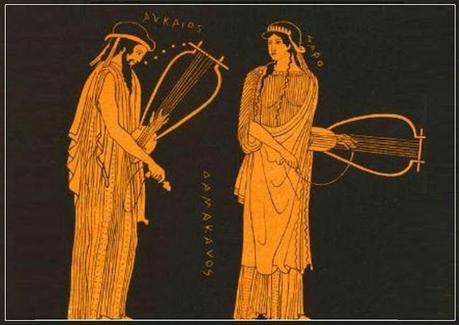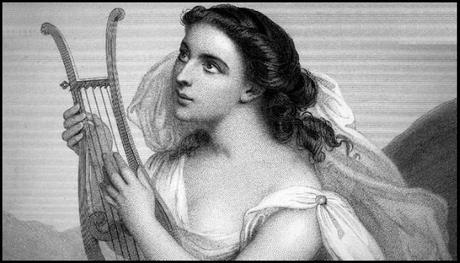And yes, when taken in conjunction with visual depictions in vase paintings and decorative reliefs (see below), plus such accounts as we have about the nature and content of Ancient Greek festivities, there is probably evidence enough to conclude that in the 7th and 6th centuries BC, in the artistic heart of an emerging civilised world, the simple answer was 'yes', songs were poetry. certainly where lyric poetry was concerned.

Alcaeus and Sappho (aka The Lyres)
Homer aside, in chronological order after Archilochus (about whom you can read a little more in an earlier blog linked here: The Truth Is...), Sappho (630-570 BC) is possibly the most famous of the ancient Greek poets. She and her contemporary Alcaeus (625-580 BC) were writing in Mytilene on the island of Lesbos at the turn of the 6th century BC. Sappho came from an aristocratic family and was well-educated. She was widely regarded as an excellent lyric poet and was sometimes referred to as 'the tenth muse'. She is thought to have composed some 10,000 lines of poetry, most of which is lost to posterity. The longest (though still incomplete) surviving poem of hers was discovered on a roll of papyrus found in Egypt and dating to the 3rd century AD, nearly 800 years after she first composed it, meaning there was either a very good oral tradition, or written versions (also since lost) had existed down the centuries, or both. It is known as Fragment 44 and describes the return of Hector to Troy with his bride-to-be Andromache, and their subsequent wedding.Like all Greek lyric poetry it had a regular meter and was created to be sung, accompanied by a lyre (hence the adjective 'lyric') or some other musical instruments, and the combination of meter and rhyme, obviously lost in modern translation, would have aided the memorising of the poetry for sung performance.
From Fragment 44....................................................................to Ilios.Lyres, melodious shawms, and the clatter of castanetsblended there, and the voices of girls in the holy song;up to heaven the glorious clamour arose...... Everywherein the streets there were bowls full of wine, and cups,myrrh and cassia, frankincense, fragrances all pell-mell.And the women of matronly age shouted Eleleu!while the men singing out in the beautiful steepscale hymncalled on Paeon, the god of the excellent bow and lyre,praising Hector the prince and Andromache his princess. Sappho
We have 160 fragments of her poems in all. In some cases only a few incomplete lines of each composition remain. Although she was married and had a daughter, many of her poems insinuate her love for other women and as a consequence she has indirectly bequeathed the words lesbian and sapphic to the English language. For reasons that are unclear, Sappho was exiled from Lesbos when she was in her thirties, spent the remainder of her life in Sicily and apparently committed suicide over a love affair with a ferryman.

solo Sappho
Moving along, I'm supposing that at some indeterminate point there was a fork in the creative road, with spoken word heading off unaccompanied down one path and song heading off along another, though of course these pathways were never clearly defined and often crossed. Just think of the troubadour tradition that stretched through the middle ages into renaissance times and regional folk traditions.The highbrow view is that 'poetry' is elevated or refined expression of thought and feeling and that song is somewhat banal in literary content, but we know such a generalisation is dangerous and untrue. There has been much banal verse committed to page (though it is not fashionable to deride it as unpoetic), just as there are many songs whose content can truly be called poetic in expression. I am supposing we will all have our favourites practitioners among the latter, Leonard Cohen, Bob Dylan, Joni Mitchell, Van Morrison, Cat Stevens, Dar Williams to name but a handful of mine (all of whom blurred a line by writing 'poetry' as well as 'songs').
If a conclusion to the ongoing debate is required, mine would be this: it depends how broad or precise one's definition of poetry is as to whether all or just some songs are poetry. I'll leave you with a tantalising fragment of my latest. One day I may complete it and set it to music - who knows? đŸ˜‰
Love Lust & Lyres................skilful hands and mouths.................................instruments of love's duet...................... orchestrating in.........desire to explore the rhythms of our passion..........taught strings, sought out by knowing fingers, upscalingin intensity.... reverberating harmonics........... pulse with sweetest music plucked..... response in one another................so finely attuned, rise together to glorious crescendo.
Thanks for reading, S ;-)
Email ThisBlogThis!Share to TwitterShare to Facebook
